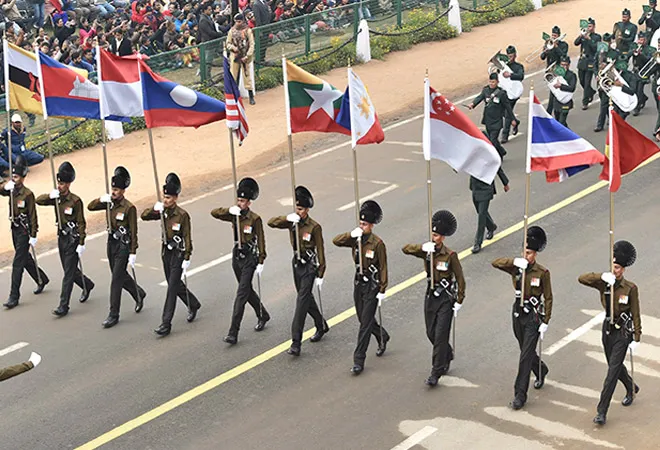
Two events in recent months have underlined India's coastal security imperatives. In April this year, India's maritime security agencies apprehended a
Russian couple on a sailing boat that had drifted close to the Mumbai harbour. The crew was on a sailing expedition, when it ran out of essentials and headed for the Indian coast, looking for assistance. When the boat was stopped by fishermen and handed over to the police, shocked officials had no answers how such a big yacht had escaped detection. Then again, this week a foreign ship hit a
fishing boat off the coast of Thiruvananthapuram and sped away, with no security agency making any effort to either contact the crew or intercept the vessel. Eerily, in a similar
hit-and-run case off the coast of Kochi in June, two fishermen had lost their lives. Thankfully, on that occasion, the coast guard seized the culprit vessel, but not before facing hard questions over how a foreign vessel had ventured so close to Indian waters.
Since the Mumbai attacks of 2008, coastal protection has been a top priority for India's maritime security agencies. As part of a coastal security
revamp, a number of measures have been adopted with varying degrees of success. This includes a chain of coastal radars, automatic identification systems and the establishment of a National Command and Control Communications Intelligence Network (NC3IN).
Such has been the clamour for better coastal management that the Union Home Ministry last week
announced its decision to set up a dedicated agency to deal with India’s near-seas threats. The proposal for a
Coastal Border Police Force (CBPF), first
suggested by Maharashtra Chief Minister Devendra Fadnavis in 2016, was heartily endorsed by Home Minister Rajnath Singh. The agency will safeguard India's maritime frontiers by assisting the Indian Coast Guard (ICG) in its littoral security endeavours. Its jurisdiction, media reports suggest, would extend beyond the territorial waters of India, to include the contiguous zone and exclusive economic zone.
Alas, the proposed move is ill-judged and unsuited to deal with India's littoral security challenges. The announcement by the Union Home Ministry suggests the government would like the new agency to be modeled after the Central Reserve Police Force (CRPF) — raised, funded, and administered from New Delhi. Yet, there is no indication that deep-set structural problems have been considered, in particular the absence of legal policing powers, which could render the new agency ineffective. As a paramilitary force, the CBPF will not have the authority and mandate of the state police. While the new agency might have the powers to arrest and detain suspects, it will not be able to register offences or carry out investigation.
The new agency might have powers to arrest and detain suspects, but will not be able to register offences or carry out investigation.
The Home Ministry's proposal is also flawed in assuming that members of the coastal community can be officially coopted into coastal security. The idea to recruit enterprising fishermen as marine police constables to assist retired naval and Indian Coast Guard (ICG) personnel ignores the fact that many fishing communities continue to resist initiatives aimed at greater coastal surveillance and identification. Many fishermen are apprehensive of having
transponders installed on their boats, with some openly voicing opposition to authorities' attempts to enforce compliance.
It isn't that fisherfolk are an unreliable lot. Their disinclination stems from the perception that joining the coastal security system invites greater scrutiny over their own activities. Fishermen believe that forced communication with security agencies is an unneeded burden as it may restrict forays into fish-rich waters across the International Maritime Boundary Line. The only reason they continue to share information with security agencies is fear of the local police.
But coastal communities do not feel obliged to cooperate with the Indian Coast Guard in the same way as the state police. ICG officers say that state police personnel are irreplaceable because of their ability to effectively network with fishermen and local groups. Their understanding of local conditions and regional ethos, in particular superior language skills, allows them to establish connections with the local community leaders. Despite
frequent interactions with the fishing community, ICG officials admit, they do not always have the expertise and agency to optimally collect actionable human information. Reportedly, the new agency will have nominated police personnel facilitating intelligence and information collection, but in the absence of institutionalised accountability of the state police towards coastal security, the arrangement is unlikely to be very effective.
Authorities may soon realise that allowing the CBPF jurisdiction over areas extending beyond the territorial waters of India runs the risk of duplicating tasks already assigned to the ICG. It could only result in turf wars and worse, blame-games during incidents.
The truth is that state agencies are increasingly disinclined to play a part in coastal patrolling.
The move to commission a new force does not obscure the fact that state agencies are increasingly disinclined to play a part in the coastal patrolling. Not only has the overall expenditure by State governments towards improving coastal security fallen significantly — with the growing numbers of non-functional assets — state police agencies are increasingly unwilling to deploy personnel for coastal patrolling. A Comptroller and Auditor General (CAG
) report in October 2016 brought out that patrolling off the coast of Odisha was down by almost 95 per cent. Similarly, in Maharashtra, work is yet to start on seven of the 19 projected coastal police stations. Even training levels are down. Of the total lot of police personnel intended for coastal duties, the Coast Guard reportedly trained less than half. Worryingly, more than 50 per cent of those trained did not know how to swim. Senior police officials attribute this deficit to the lack of motivation among junior cadres in carrying out sea-duties. But officers privately concede that the sundry
terrestrial tasks police forces are burdened with — including VVIP escort and
bandobast for political events — leaves them with little time and energy for coastal patrolling.
By all accounts, the idea of setting up a new coastal police force is not so much an initiative aimed at improving the Indian Coast Guard's efficiency, as a tactic to separate state police agencies from the national coastal security project. The objective is sought to be achieved by the substitution of state-level marine police with a centrally controlled agency. It is for this reason that Chief Minister Fadnavis' proposal for a coastal police in 2016 was enthusiastically endorsed by his counterparts in other coastal states. The plan's implementation, however, will create an outfit with the same constraints and limitations as the agency it is meant to assist.
In the end, all the additional resources spent on the training and equipment of the new Coastal Border Police Force could well end up being wasted. It is clear that the newly trained personnel will have neither the legal authority nor operational agency to deal with the coastal challenges at hand. The absence of an apex maritime authority will only add to the problems of inter-agency cooperation.
Ironically, granting powers to the new coastal border police might create a problem of overlapping jurisdiction with the state police, complicating matters further. One way or the other, a centrally funded police force will offer no solutions to India's coastal conundrum.
The views expressed above belong to the author(s). ORF research and analyses now available on Telegram! Click here to access our curated content — blogs, longforms and interviews.



 Two events in recent months have underlined India's coastal security imperatives. In April this year, India's maritime security agencies apprehended a
Two events in recent months have underlined India's coastal security imperatives. In April this year, India's maritime security agencies apprehended a  PREV
PREV


